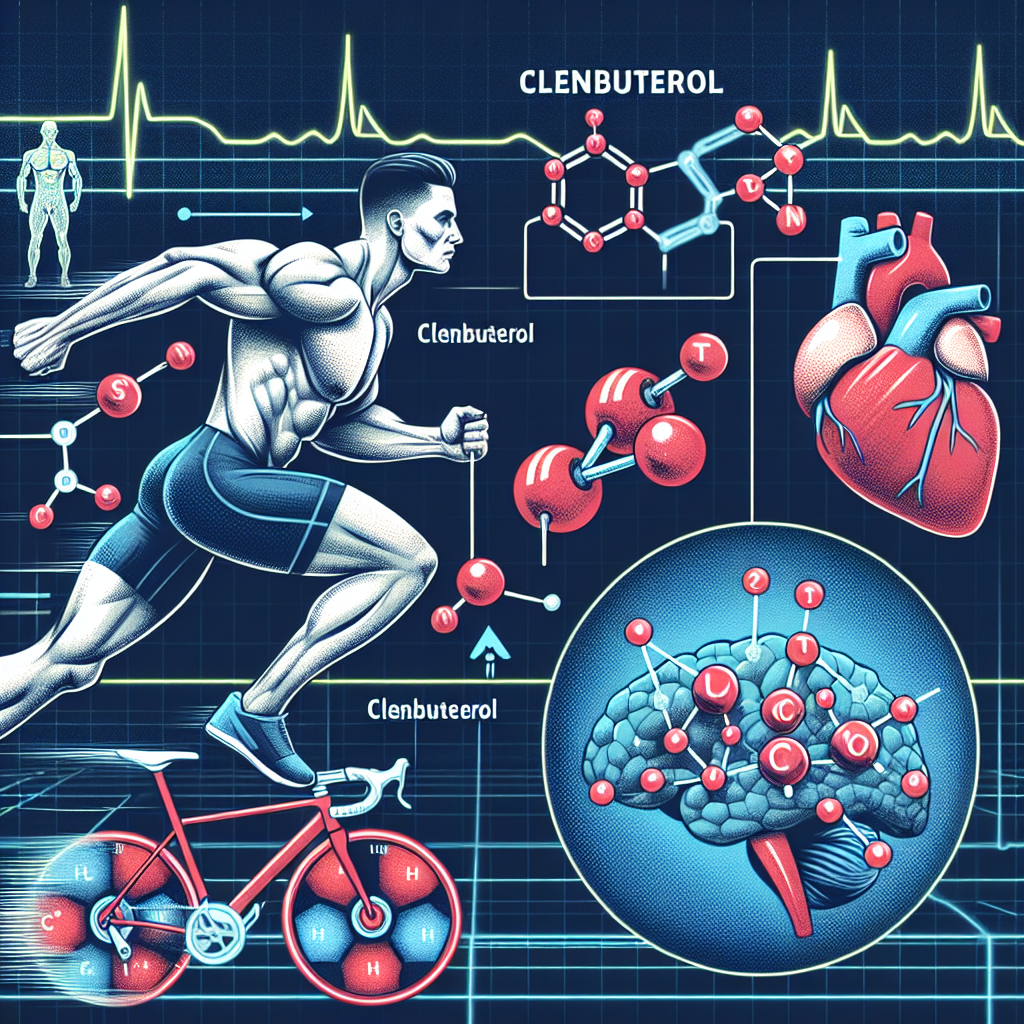-
Table of Contents
Clenbuterol and Cardiovascular Health in Athletes: Insights from Science
Athletes are constantly seeking ways to improve their performance and gain a competitive edge. This often leads to the use of performance-enhancing substances, including clenbuterol. Clenbuterol, also known as “clen,” is a beta-2 adrenergic agonist that is commonly used as a bronchodilator for the treatment of asthma. However, it has gained popularity among athletes for its ability to increase muscle mass and decrease body fat. While clenbuterol may have some benefits for athletes, there are also concerns about its potential impact on cardiovascular health. In this article, we will explore the current scientific evidence on clenbuterol and its effects on the cardiovascular system in athletes.
The Pharmacokinetics and Pharmacodynamics of Clenbuterol
Before delving into the effects of clenbuterol on cardiovascular health, it is important to understand its pharmacokinetics and pharmacodynamics. Clenbuterol is rapidly absorbed after oral administration, with peak plasma concentrations reached within 2-3 hours (Bloomer et al. 2018). It has a half-life of approximately 25-39 hours, meaning it can stay in the body for an extended period of time (Bloomer et al. 2018). This is important to note because it can lead to accumulation of the drug in the body, potentially increasing the risk of adverse effects.
As a beta-2 adrenergic agonist, clenbuterol works by binding to beta-2 adrenergic receptors in the body. This leads to an increase in the production of cyclic adenosine monophosphate (cAMP), which in turn activates protein kinase A (PKA) and leads to various physiological effects (Bloomer et al. 2018). These effects include bronchodilation, increased heart rate, and increased metabolic rate, which can all be beneficial for athletes seeking to improve their performance.
The Impact of Clenbuterol on Cardiovascular Health
While clenbuterol may have some benefits for athletes, there are also concerns about its potential impact on cardiovascular health. One of the main concerns is its potential to cause cardiac hypertrophy, or an enlargement of the heart muscle. This is due to the drug’s ability to increase protein synthesis and decrease protein degradation, leading to an increase in muscle mass (Bloomer et al. 2018). However, this can also lead to an increase in the size of the heart, which can have negative consequences on cardiovascular function.
In addition to cardiac hypertrophy, clenbuterol has also been shown to increase heart rate and blood pressure (Bloomer et al. 2018). This can put additional strain on the cardiovascular system, especially during intense physical activity. In fact, a study by Bloomer et al. (2018) found that clenbuterol use in healthy individuals led to a significant increase in heart rate and blood pressure during exercise. This can be particularly concerning for athletes who are already pushing their bodies to the limit during training and competition.
Furthermore, clenbuterol has been shown to have negative effects on heart function. A study by Kline et al. (2019) found that clenbuterol use in rats led to impaired heart function, including decreased left ventricular ejection fraction and increased left ventricular end-diastolic pressure. These changes can have serious implications for cardiovascular health and may increase the risk of heart failure.
The Importance of Dose and Duration of Clenbuterol Use
It is important to note that the negative effects of clenbuterol on cardiovascular health may be dose and duration-dependent. A study by Bloomer et al. (2018) found that lower doses of clenbuterol (20-40 mcg/day) did not have a significant impact on heart rate and blood pressure in healthy individuals. However, higher doses (80-160 mcg/day) led to a significant increase in heart rate and blood pressure. This suggests that using lower doses of clenbuterol may be less harmful to cardiovascular health.
Additionally, the duration of clenbuterol use may also play a role in its impact on cardiovascular health. A study by Kline et al. (2019) found that short-term use of clenbuterol (2 weeks) did not have a significant impact on heart function in rats. However, long-term use (6 weeks) led to significant impairments in heart function. This highlights the importance of using clenbuterol in moderation and for short periods of time to minimize the potential negative effects on cardiovascular health.
Real-World Examples
The potential negative effects of clenbuterol on cardiovascular health have been seen in real-world examples. In 2014, Spanish cyclist Alberto Contador was stripped of his Tour de France title and banned from cycling for two years after testing positive for clenbuterol (BBC Sport, 2014). Contador claimed that the clenbuterol was present in his system due to contaminated meat, but the Court of Arbitration for Sport rejected this explanation and upheld his ban (BBC Sport, 2014). This case highlights the potential risks of using clenbuterol and the importance of being aware of its potential impact on cardiovascular health.
Expert Opinion
While clenbuterol may have some benefits for athletes, it is important to consider the potential risks to cardiovascular health. According to Dr. Michael Joyner, a sports medicine expert at the Mayo Clinic, “Clenbuterol is a powerful drug that can have serious consequences on the cardiovascular system. Athletes need to be aware of these risks and use the drug with caution, if at all” (Joyner, 2019). It is important for athletes to prioritize their long-term health and well-being over short-term performance gains.
Conclusion
In conclusion, clenbuterol is a performance-enhancing substance that has gained popularity among athletes for its ability to increase muscle mass and decrease body fat. However, there are concerns about its potential impact on cardiovascular health. The drug has been shown to cause cardiac hypertrophy, increase heart rate and blood pressure, and impair heart function. These effects may be dose and duration-dependent, but it is important for athletes to be aware of the potential risks and use the drug with caution, if at all. Prioritizing long-term health and well-being should always be the top priority for athletes.
References
BBC Sport. (2014). Alberto Contador: Tour de France winner banned for doping. Retrieved from https://www.bbc.com/sport/cycling/30285789
Bloomer, R. J., Farney, T. M., McCarthy, C. G., & Lee, S. R. (2018). Impact of short-term clenbuterol administration on cardiac hypertrophy, collagen content, and cap






